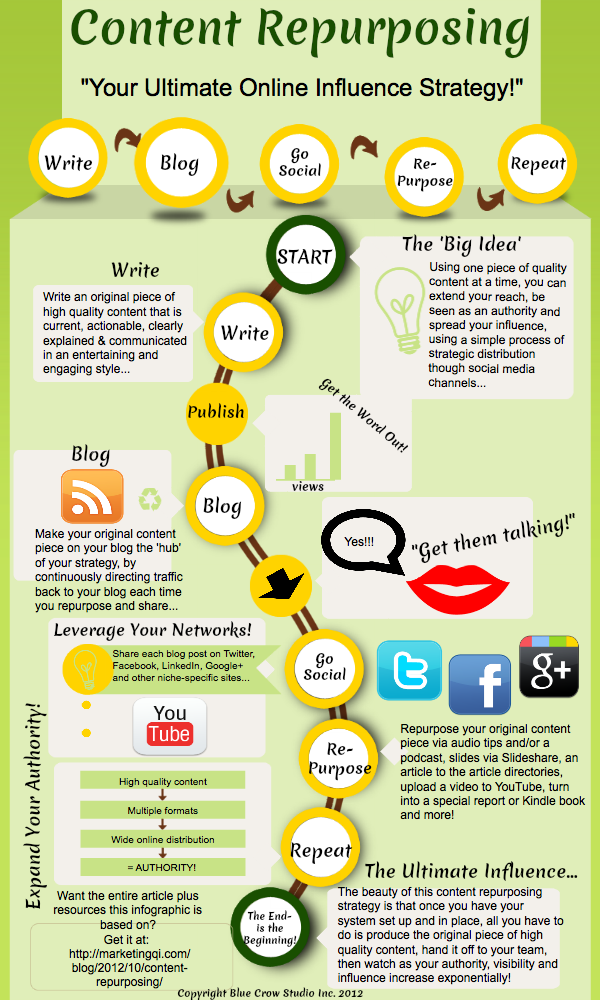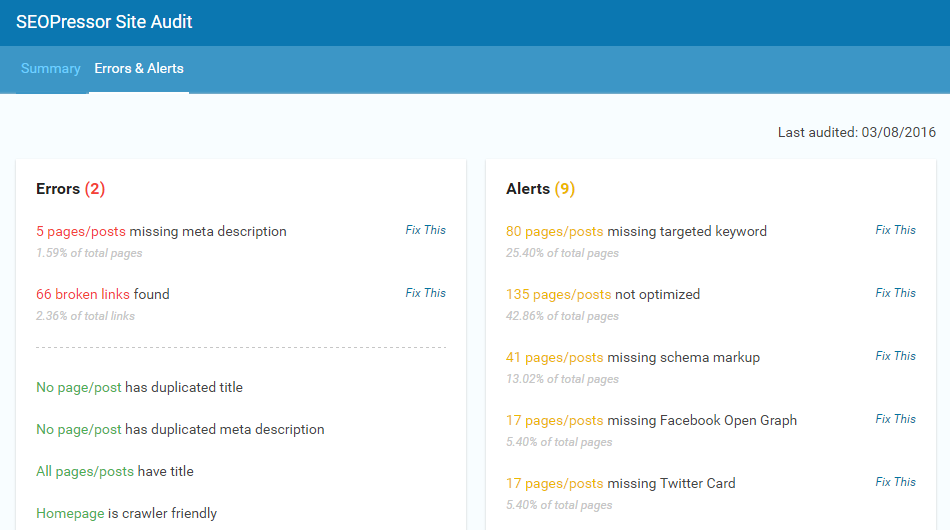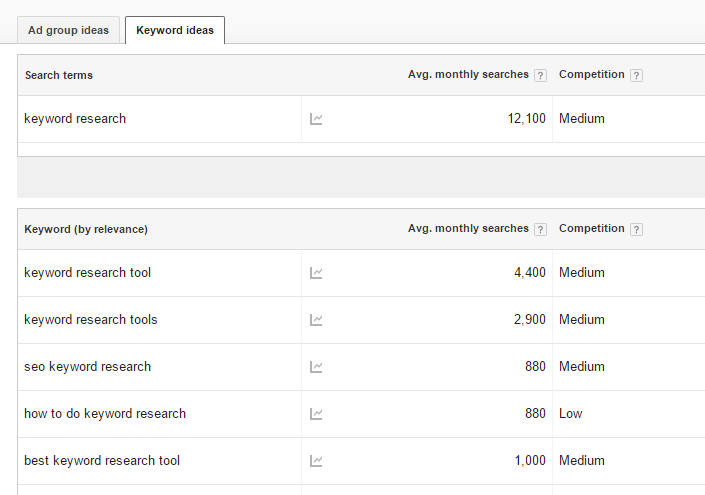Steph W. from SEOPressor


...help you check your website and tell you exactly how to rank higher?


88
score %
SEO Score

Found us from search engine?
We rank high, you can too.
SEOPressor helps you to optimize your on-page SEO for higher & improved search ranking.
By allysa on August 10, 2016

The Internet is potentially infinite in size and is getting bigger every day. The amount of content proliferated on the Internet is already staggering. Last year, there were 211,000,000 new pieces of content being published every second.
This is because people understand the power of content marketing, and everyone is trying to leverage it.
In 2015, there were 4 million Google searches a second, and that number is still increasing until today. As such, content marketing is becoming more challenging than ever that every content marketing is competing against a greater total volume of content.
Because of the amount of new content being posted, old content may be useless after just a few weeks. This puts an incredible pressure on content marketers to constantly generate new ideas, new material, and new keywords to target. New, new, new.
The point of all this is that if the quantity goes up, your quality has to shine so much brighter to hook people.
Enter content repurposing.

Repurposing old content can also saves you a lot of time.
Repurposing your content will enable you to update topics you have previously covered with new information, to give it a fresh lease of life without the need to duplicate.
This can have huge benefits for your SEO campaigns and drive a new generation of traffic to your site, without the brain-melting conceptual work that can be so exhausting to many content marketers.
“Content is King” is repeated ad nauseam, but really, it’s time we start to rank the types of content a little more carefully.
In this article, I’m going to cover two key types of content:
1) Fresh Content
Fresh content is the ‘new’ content that creates so much pressure on content marketers. It’s what a website needs to do to appear relevant and current, and make people believe in the authority of the site they’re visiting.
However, this content tends to be much shallower, as so many trends are relatively short-lived. This means less effort to write and comment upon, but less yield over the long term as far as traffic is concerned.
2) Evergreen Content
Evergreen content focuses more on the fundamentals of life that don’t go out of fashion. Two of the most popular examples are health and weight loss – issues that don’t go away, and for which the solutions are always much the same. This content requires more in-depth knowledge to show value, but will yield much greater traffic over its lifespan.
There are advantages to both kinds of content. In this article, we’re going to look at trying to synthesize these advantages across each category, so you get the best of all worlds and maximize your ROI. If you can repurpose content effectively, you’ll quickly understand how to get more traffic to your site.
Here’s how:
Doing an audit of your content is a great way to familiarize yourself with the history and direction of your content so far, and identify where you should be going next. It’s good practice to audit your site every three months anyway, but it will put you in an ideal position for repurposing in the process.
First of all, split your existing content into the following categories:
If you have content that simply isn’t creating any traffic, or isn’t up to the standards you’ve risen to since you started out, or you simply don’t like it anymore, then you may be best served by unpublishing it. It’s also a good idea to unpublish anything that is no longer relevant to your current audience. Your audience will evolve and change with your approach.
If you’ve covered a topic and there are new developments in that industry, you can post your take on this information, including insights and commentaries, to give the content a new lease of life. Alternatively, it can serve as a spur to create a new article based on that new information.
It’s natural that as you continue on your journey toward mastering a niche, you may well have more to say about it than when you first started out. Upgrading your content is an opportunity for you to get into greater detail, share your personal learning journey with your readers, and make your content even more valuable.
You can achieve a lot by changing the focus, rewriting for a new and different audience than the one you first identified, or using a different format to the original content to make it sharper and fresher. By rewriting and not self-plagiarising, this is the best way to muscle up work already done.
More on that later. If it becomes obvious to you that you should have approached an article differently, or that your analytics are showing you something isn’t quite working, this is the best thing you can do.
Once you’ve identified where your existing content stands, there’s even more you can to do make sure you make the most of it.
It can be difficult to know what to spend time upgrading and updating, but there are several ways you can identify good candidates.
First, undertake a review of your posts’ performance.

You can use SEOPressor Site Audit to find out what didn’t perform well, and that will instantly give you an idea on what to upgrade.
Go back over them and see what you might have missed that audiences might respond better to. Make sure you include any major updates or changes that have happened since you first wrote the content.

Keyword Planner by Google AdWords is a free tool that can help you to look for more keyword ideas and analyze the performance.
Re-do your keyword research, and identify what people are searching for now. Include these words and phrases in the new version of your content. This will help that tired content finally start attracting new traffic. If the keywords you tried last time aren’t performing, find new keywords and let them determine your angle this time around. Remember, what your audience already wants should always lead you, that way it won’t be hard to hook them.
If all your content is doing pretty well, it can still do better.

We usually use the suggested optimization from SEOPressor to keep our blog post SEO-friendly.
The techniques in this article will help you strengthen good content to make it great, and turn popular content into money-making content. If you have a top ranked article, that’s where your strongest call to action should be.
A phenomenon that is being witnessed with increasing regularity these days is the social wave effect. News travels through networks, which means it can take time to reach different people.
So long, in fact, that people can forget about it, and be surprised by it once again. One example is how Leslie Neilsen’s death saw an outpouring of sympathy on social media in 2016, despite dying in 2010.
While this may be a macabre example, you will know from your own social media use that memes you saw years ago are shared afresh by people discovering them for the first time. If your content is evergreen, you can use this same social wave effect to give your content wave after wave after wave of traffic.
· Promoting old but evergreen content can be simple. Throwback Thursday is a common opportunity to look back on some of your best ranked articles on social media.
· Your email subscriber list will be constantly changing. After three to six months, there may be more new subscribers than existing ones. This is the ideal time to promote an old post to get new eyes on it.

We compile both new and old blog posts in the newsletter so that our subscribers can catch up with all the marketing techniques.
· Shorten your long form posts to repurpose them as shareable social content. Use Canva to turn an article into an infographic like how we did it in one of our blog posts:
Then include a link or blog offer to the full content so those whose interest is piqued can find out more.
· Checklists can help you boil down your long form content into only the actionable steps, with short and to the point descriptions. Trust me, this works well for people because it is helping them to achieve their goals. This is how I did it last time:

Offering checklist as your blog offers not only helps your readers, but it will also increase your conversion rate.
· Enlist your audience with targeted, content rich guides on topics that match demographic variances within your existing audience, maximizing its shareability within their networks.
Aside from these, you can also set up a series of rich content guides that are specific to topics, then assign each topic to an audience segment.
Google penalizes duplicated content heavily. Don’t use the same body text, meta description, or title. Simply rephrasing sentence by sentence is the most energy-efficient way to repurpose, but multimedia will allow you to circumvent duplication algorithms while increasing your touchpoints.
YouTube is the biggest site on the Internet and is considered cooler by younger generations than Facebook. You can turn your blogs into video in several ways. If you have great communication skills as a presenter, you can film yourself talking into a camera and overlay it with images fairly easily.
Just like how Moz usually does their Whiteboard Friday:
Turn your content into a script, and you can develop your personal brand while getting twice the mileage from the mental effort of first creating the content. There are plenty of people offering hand-drawn video sketches or you can even play around with dynamic typography. All of these require some additional investment, but could generate huge amounts of traffic.
With a podcast, you don’t even need the production value and investment of a video. You can simply read your blog into a microphone, upload it, and hey presto!
https://soundcloud.com/cranberryradio/marketing-and-content-industry
More content, minimal effort, and a new lease of life. If you find you’re getting traffic, it’s an easy thing to continue and develop. Alternatively, you can answer major questions or criticisms of the content by addressing comments posted to your articles in a weekly podcast roundup.
I touched on Canva already, but condensing your article into bullet points and shining it up with some stylish graphics will guarantee it doesn’t look or feel the same to readers, in a good way though.
Here’s a good example of infographic:

If you’ve done all this work and you don’t ensure your SEO is firing on all cylinders, you’re doing it for nothing.
Here at SEOPressor, we have an easy to use, intuitive WordPress SEO plugin that helps people make sure every post will perform well so that it will be ranked on Google.

The built in plug-in enables people to do everything at a glance, and will even notify you if you’ve missed an opportunity.
The key things you need to do to make sure you content performs are:
And this is just the beginning. With site-wide, page specific and post specific analytics, link, and score managers, and a constant gauge of the site’s overall health, it allows you to be as effective on the micro and macro scale of site management, in a fraction of the time.
Repurposing is easy. Repurposing has its challenges, but they’re well worth the time relative to generating and delivering new ideas. You may have to put a little more effort to repurpose content effectively, but that’s better than wasting all the effort you went to in devising the underperforming content in the first place.
You owe it to yourself, to your content and above all, to your audience to maximize the life cycle of every piece of content you produce.
Throughout all these steps, your focus must be on quality, as well as strategy. The strategy is all about lifting your diamonds out of the rough and giving them a chance to shine. If you lift out a pebble and put it front of people, of course, they aren’t going to be impressed. Your strategy will only ever be as successful as your quality allows it to be.
That said, repurposing is a great way to wring every last drop of ROI from every idea you’ve ever had.
By upgrading, updating and promoting this content, it will improve your SEO performance, expand your audience, and save you time, money and energy. Get to it.
Do you have any other tips to repurpose old content to get more traffic to your website? Do share it with us in the comment section down below!
Updated: 20 February 2026


Save thousands of dollars (it’s 100x cheaper)

Zero risk of Google penalty (it’s Google-approved)

Boost your rankings (proven by case studies)
Rank High With This Link Strategy
Precise, Simplified, Fast Internal Linking.
